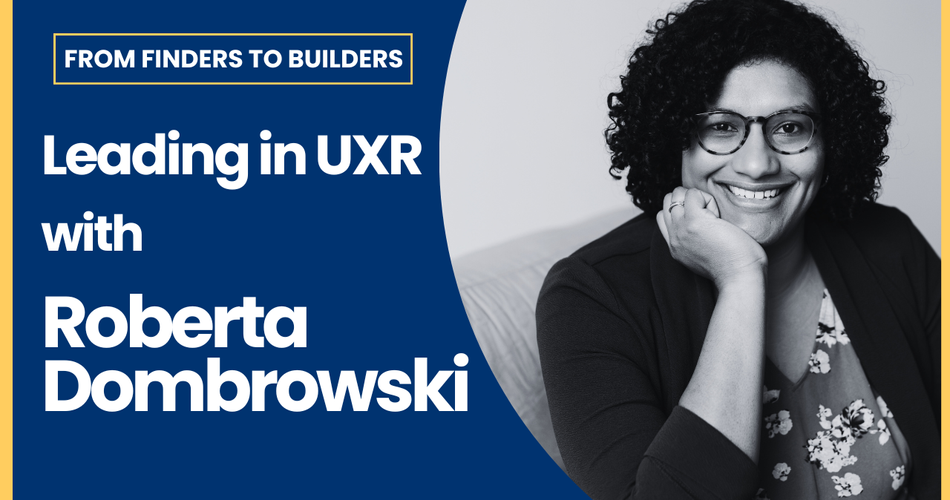Welcome back to another exciting blog post from the "From Funders to Builders" series!
In this episode, we talked with Roberta Dombrowski, Research Partner at Maze and Leadership Coach at Learn Mindfully.
Roberta has been in the research space for a decade, transitioning from ed-tech products to specializing in user research platforms. Her journey and wisdom offer enlightening perspectives on what it means to lead without holding a manager title, and how to navigate such roles effectively.
The Concept of Leadership in UX Research
Roberta starts by clarifying a common misconception: anyone can be a leader, irrespective of their job title. Leadership is not confined to those managing others; it’s about creating a vision, inspiring, encouraging collaboration, and sharing insights. She emphasizes that everyone has a unique leadership style, which can be just as effective as traditional models, like those we often associate with power figures.
Leading Without a Title
When asked about leading without a formal title, Roberta shares that it's all about finding opportunities within the business and strategically prioritizing what’s essential. In her experience, whether as a team of one or in the inception stages of forming a research team, the key traits involve curiosity, continuous learning, empathy, and the ability to run experiments and iterate.
Roberta mentions that leading also means seeing patterns within the business and the customer insights and translating these into actionable priorities. This proactive stance is vital for pushing the business forward and effectively leveraging the insights garnered from research.
The Seven Deadly Sins of Being a Lone Researcher
We also discussed the "seven deadly sins" that solo researchers might commit, emphasizing the importance of focusing on building relationships over diving straight into the craft of research.
Stakeholders are often more concerned with business goals than research methods, so starting small and building trust is crucial.
Also, Roberta highlights the pitfalls of not sharing wins, reminding us that communication is key. Keeping stakeholders updated on progress and victories ensures alignment and appreciation for the research's impact.
Scaling the Team and Embracing the Transition
One significant topic we explore is the transition from solo researcher to team leader. Roberta talks the challenges faced during this transition, often referred to as the "messy middle," where one juggles between contributing individually and managing a team.
This phase can feel overwhelming, but it’s crucial for further growth. She advises that embracing management roles requires additional skills such as coaching, enabling, and career pathing for team members. This transition is not just about scaling the number of team members but evolving personal capabilities to support and lead the new team effectively.
When Titles Force Your Hand
We also touch upon how researchers sometimes feel compelled to take on leadership roles due to career progression, despite not naturally being inclined towards management.
Roberta’s advice here is to introspect and consider your long-term vision, both professionally and personally. Large organizations often provide paths for continuing as a principal-level contributor without moving into management, but smaller companies may not offer such flexibility.
The Ever-Present Imposter Syndrome
Roberta acknowledges the widespread nature of imposter syndrome, especially in new leadership roles. She shares strategies to manage it, such as separating the critical inner voice from your true self and keeping a “wins journal” to record and reflect on achievements and positive feedback.
The First 90 Days: A Blueprint for Success
One of Roberta’s favorite topics is managing the initial days of a new role. She advocates approaching the first 30, 60, and 90 days methodically - focusing on understanding the people, products, and processes within the organization. Building relationships and observing the existing systems before making impactful decisions is crucial.
Final Thoughts and Key Takeaways
To wrap up, Roberta leaves us with three essential tips for solo researchers:
1. Build Relationships: Establish trust and connections across the organization.
2. Take Your Time: Be patient during onboarding and absorb the culture and processes thoroughly.
3. Stay Curious and Have Fun: Keep the passion for learning alive and enjoy the journey. Roberta’s insights and experiences provide a rich tapestry
Listen to the full episode:

Follow Roberta on LinkedIn or check out Learn Mindfully
Check out some of Roberta's articles to dig deeper into what we discussed in this episode:
Building a research practice, the first 90 days

Embracing onlyness

Getting to the heart of influence

Subscribe to our email newsletter and unlock access to members-only content and exclusive updates.




Comments